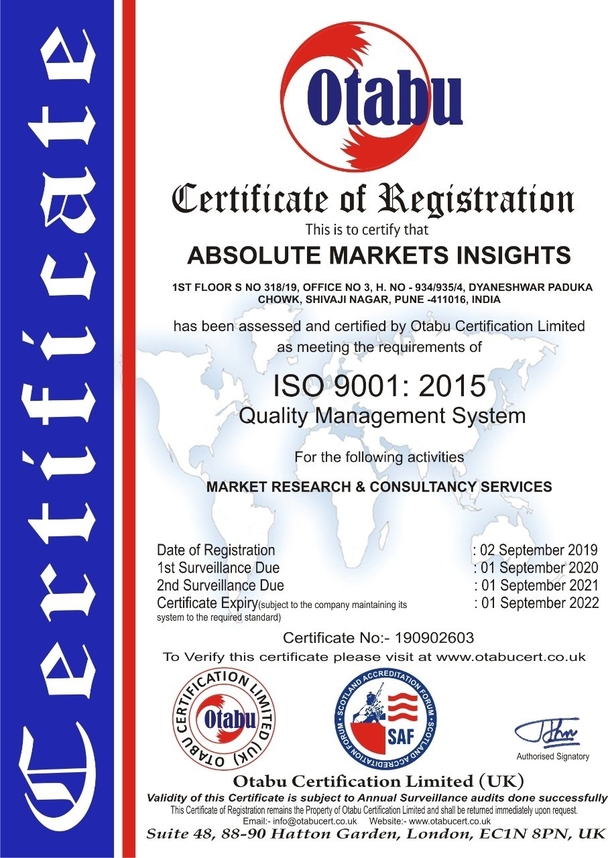
Global Sustainable Supply Chain Finance market is expected to reach US$ 2,926,759 million by 2027, growing at an estimated CAGR of 18.24% over the forecast period mainly due to the increased focus by firms in adopting sustainable models in their supply chain network
The importance of supply chain management is ever increasing. Firms constantly work on optimizing their supply chain network to reduce costs that increases their profitability options. Also, there is a significant amount of cash which gets stuck in the supply chain network. On one hand, buyer’s want to delay accounts payable so that they can use the money as working capital. On the other hand, suppliers would like their payments credited at the earliest. Supply chain finance model solves this issue; wherein the financial institute issues accounts receivable to the supplier at the earliest with minimal fee, and the buyer would pay the bank before the invoice date. This model has been widely adopted by both small & medium enterprises as well as large enterprises.
Since the past decade there has been growing demand to follow sustainable practices. It is estimated that only 10-30% of company’s footprint lies within the firm’s operations; rest lies with the consumer use and supply chain. Hence, suppliers are now being forced to follow sustainable methods which includes social, environmental and economic models. However, due to liquidity crisis, suppliers find it difficult to enact these models into their supply chain. This is where sustainable supply chain finance, helps suppliers as well as buyers to adopt sustainable models. Banks such as ING Bank N.V., allows buyers to incentivize the suppliers which are focusing on environmental, social, governance (ESG) issues, by providing discount on invoices. This ensures a win-win-win situation for buyers, suppliers and the banks.
“With mounting pressure from consumers, stakeholders, government on achieving sustainable development goals, firms are working towards sustainable supply chain management models. This would drive the sustainable supply chain finance market exponentially. Financial institutions such as banks are allowing firms to incentivize their suppliers in following sustainable models which includes social, economic, and governance. United States held the largest market share and is expected to continue the same trend over the forecast period”
The detailed research study provides qualitative and quantitative analysis of global sustainable supply chain finance market. The market has been analyzed from demand as well as supply side. The demand side analysis covers market revenue across regions and further across all the major countries. The supply side analysis covers the major market players and their regional and global presence and strategies. The geographical analysis done emphasizes on each of the major countries across North America, Europe, Asia Pacific, Middle East & Africa and Latin America.
Purchase the complete report titled “Sustainable Supply Chain Finance Market - Global Insights, Growth, Size, Comparative Analysis, Trends and Forecast, 2015-2027” at
Global Sustainable Supply Chain Finance Market Share in 2018, By Region
Key Findings of the Report:
- In terms of revenue, global sustainable supply chain finance market is expected to reach US$ 2,926,759 million by 2027, due to growing importance shown by firms in adopting sustainable supply chain management.
- By type, financial institution is expected to witness a considerable growth over the next eight years due to increased tie ups with SME’s from developing countries.
- By organization size, small and medium enterprises are expected to witness a considerable growth over the next eight years due to increased focus on maintaining optimal working capital
- North America sustainable supply chain finance market is projected to witness a CAGR of 19.14% over the forecast period. This is mainly due to stringent regulations related to sustainable environmental practices.
- Some of the players operating in the sustainable supply chain finance market are BNP Paribas, Citigroup, Inc., DBS Bank Ltd, First Abu Dhabi Bank, FMO, HSBC Group, ING Bank N.V., Standard Chartered, TIER Sustainable Supply Chain Finance amongst others
Sustainable Supply Chain Finance Market:
- By Type:
- Financial Institution
- Buyer Financed
- Supplier Financed
- Multiple Source
- By Organization Size:
- Large Enterprises
- Small and Medium sized Enterprises
- By End Users
- Foot & Apparel
- Food & Beverages
- Power & Energy
- Automobile
- Chemical & Materials
- Manufacturing
- Others
- By Geography
- North America
- U.S.
- Canada
- Mexico
- Europe
- France
- The UK
- Spain
- Germany
- Italy
- Nordic Countries
- Denmark
- Finland
- Iceland
- Norway
- Sweden
- Benelux Union
- Belgium
- The Netherlands
- Luxemburg
- Rest of Europe
- Asia Pacific
- China
- Japan
- India
- New Zealand
- Australia
- South Korea
- Southeast Asia
- Indonesia
- Thailand
- Malaysia
- Singapore
- Rest of Southeast Asia
- Rest of Asia Pacific
- Middle East & Africa
- Saudi Arabia
- UAE
- Egypt
- Kuwait
- South Africa
- Rest of Middle East & Africa
- Latin America
- Brazil
- Argentina
- Rest of Latin America
- North America

